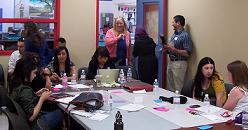
Berkeley Labor Center 2011 eAdvocacy Trainings
<
p>Matt and Misty had a great time working with the UC Berkeley Labor Center on May 25th and May 26th for their Online Media Training Workshop. Talking to groups working across the labor movement, we had some great conversations around setting up organizational infrastructure for communications at your organization.
The following are the materials we used during the Berkeley Labor Center Spring 2011 eAdvocacy Trainings in Berkeley.





 I am excited to say we had an adventurous week in Modesto, Fresno, and Visalia on a 3 day road trip. We had great food, talked to awesome people, and even finished our first
I am excited to say we had an adventurous week in Modesto, Fresno, and Visalia on a 3 day road trip. We had great food, talked to awesome people, and even finished our first